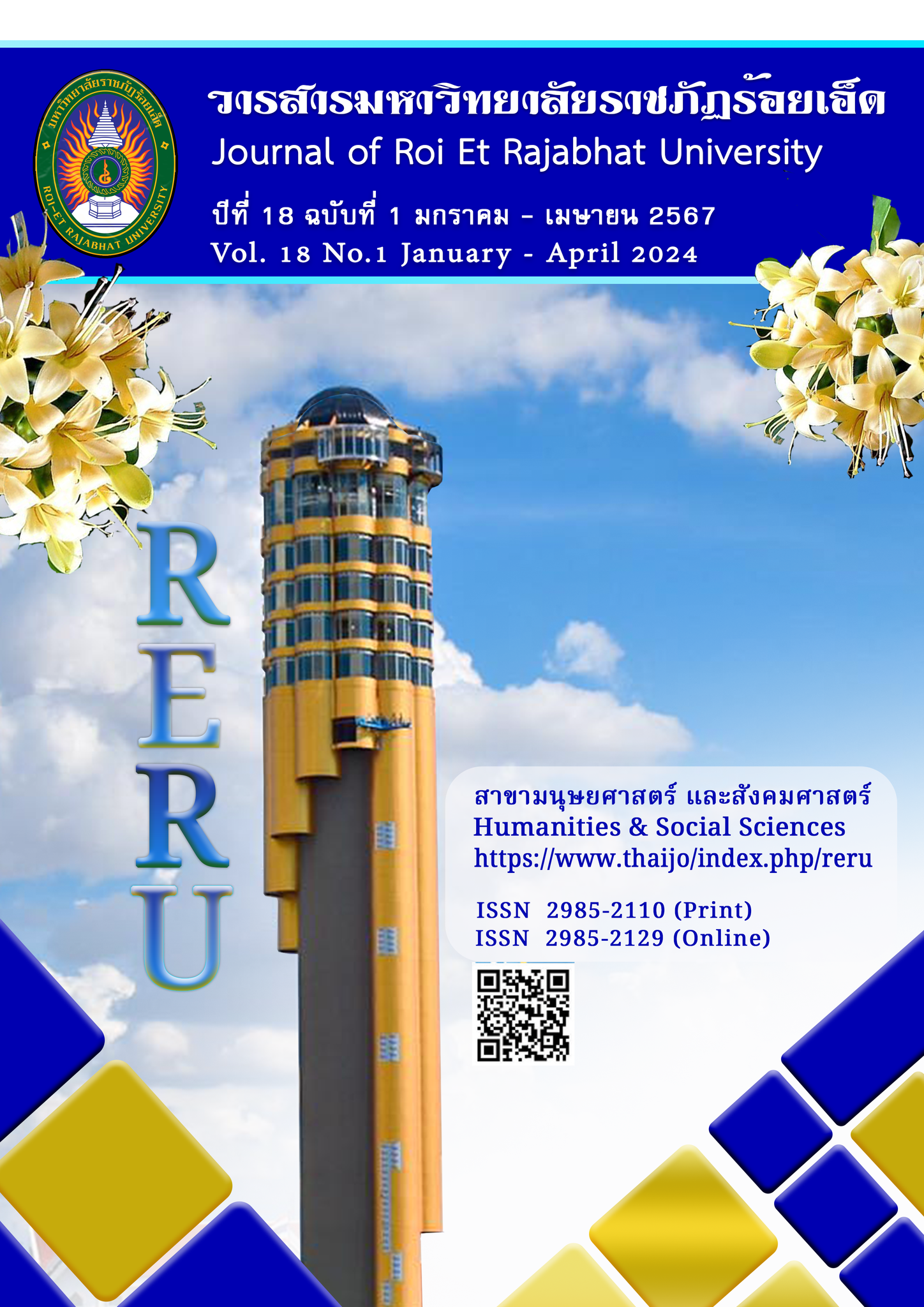Learning and Innovation Skill Development Guidelines for Pre-service Teachers in Social Studies Education, Roi Et Rajabhat University
Keywords:
Development guideline, Learning and innovation skills, Pre-service teacherAbstract
The objectives of this research were 1) to study learning and innovation skills, 2) to investigate levels of factors that affect the development of learning and innovation skills, and 3) the development guidelines of learning and innovation skills of pre-service teachers using a mixed-method study beginning with quantitative method, followed by qualitative method. Sample of quantitative group was 64 pre-service teachers in the field of social studies. The 30 informants of target groups with qualitative method who were purposively selected consisted of educational institution administrators, supervising teacher of pre-service teachers, and university supervisors. The quantitative research tools were a 5-level estimation scale questionnaire. Values of Index of Conformity (IOC) were 0.67– 1.00. The entire reliability value was 0.82. The quantitative was structured interviews used descriptive and content analysis. Statistics used in research included mean and standard deviation.
The research findings indicated that 1) Overall average of students’ learning and innovation skills was at a high level in every aspect. 2) Overall average of factor levels towards a development of students’ learning and innovation skills was at a high level in every aspect. 3) Recommendations in the development guideline of learning and innovation skills consisted of 4 aspects: 1) Curriculum should promote academic activities, working skills, as well as morality and ethics. 2) Learning management should incorporate problem-based learning as a basis to create innovation in communities. 3) Assessment and evaluation should emphasize participation and use of modern innovations. 4) Learning environment in educational institution should create network of teacher education institutions for development planning of students' learning and innovation skills.
References
กิติต์ภพ ทวีวัฒน์. (26 มกราคม 2566). สัมภาษณ์. ครูพี่เลี้ยงนักศึกษาฝึกประสบการณ์วิชาชีพครูโรงเรียนวัดสระทอง.
กัลยา สร้อยสิงห์. (2563). ปัจจัยที่ส่งผลต่อทักษะการเรียนรู้และนวัตกรรมในศตวรรษที่ 21 ของนักศึกษาวิทยาลัยดุสิตธานี.
วารสารวิทยาลัยดุสิตธานี, 14(2), 486–501.
คณะครุศาสตร์. (2565). นโยบาย และแผนพัฒนาคณะครุศาสตร์ ปีการศึกษา 2565-2567. สืบค้นเมื่อ 4 พฤษภาคม 2566,
จาก https://edu.reru.ac.th/wp-content/uploads/2022/05/18-05-65.pdf
ณิชาภา เจริญรูป และณัฐพงษ์ จรทะผา. (2560). แนวทางการพัฒนานักศึกษาฝึกประสบการณ์วิชาชีพครูสู่ความเป็นพลเมือง
ในศตวรรษที่ 21. จันทบุรี: มหาวิทยาลัยราชภัฏรำไพพรรณี.
ธนกฤตา แจ่มด้วง. (2560). แนวทางพัฒนาทักษะการเรียนรู้และนวัตกรรมของนักศึกษามหาวิทยาลัยศิลปากรตามนโยบาย
ประเทศไทย 4.0. วิทยานิพนธ์ ศึกษาศาสตรมหาบัณฑิต สาขาวิชาพัฒนศึกษา. กรุงเทพฯ: มหาวิทยาลัยศิลปากร.
ธนาดล พิสิฐปัญญาพงศ์. (19 มกราคม 2566). สัมภาษณ์. ครูพี่เลี้ยงนักศึกษาฝึกประสบการณ์วิชาชีพครูโรงเรียนวัดบูรพาภิราม.
ชูศรี วงศ์รัตนะ. (2553). เทคนิคการใช้สถิติ (พิมพ์ครั้งที่ 9). กรุงเทพฯ: เทพเนรมิตการพิมพ์.
ตันติกร ขุนาพรม. (2558). การพัฒนาตัวบ่งชี้ทักษะในศตวรรษที่ 21 ของนิสิตระดับปริญญาตรี คณะวิทยาศาสตร์ มหาวิทยาลัย
ของรัฐภาคตะวันออกเฉียงเหนือ. วิทยานิพนธ์ การศึกษามหาบัณฑิต. มหาสารคาม: มหาวิทยาลัยมหาสารคาม.
พาที เกศธนากร. (2561). การพัฒนาตัวบ่งชี้ทักษะของนักศึกษาในศตวรรษที่ 21 คณะครุศาสตร์ มหาวิทยาลัยราชภัฏกาญจนบุรี.
วารสารราชภัฏเพชรบูรณ์สาร, 20(1), 97-107.
พิณสุดา สิริธรังศรี. (2557). รายงานการวิจัยเรื่อง รูปแบบการบริหารจัดการสถานศึกษาขั้นพื้นฐาน. กรุงเทพฯ: เลขาธิการ
สภาการศึกษา.
มานิตย์ อาษานอก. (2561). การบูรณาการกระบวนการคิดเชิงออกแบบเพื่อพัฒนานวัตกรรมการจัดการเรียนรู้. วารสารเทคโนโลยี
และสื่อสารการศึกษา, 1(1), 6-12.
วิจารณ์ พานิช. (2555). วิถีสร้างการเรียนรู้เพื่อศิษย์ในศตวรรษที่ 21. กรุงเทพฯ: ตถาตา พับพลิเคชั่น.
วิภาวี ศิริลักษณ์. (2557). การพัฒนาตัวบ่งชี้ทักษะของนักเรียนในศตวรรษที่ 21. วารสารศึกษาศาสตร์มหาวิทยาลัยนเรศวร,
(4), 155-165.
สุเมธ สระเย็น. (19 มกราคม 2566). สัมภาษณ์. ครูพี่เลี้ยงนักศึกษาฝึกประสบการณ์วิชาชีพครูโรงเรียนหนองกุงศรี.
ไสว ฟักขาว. (2561). การจัดการเรียนรู้เพื่อส่งเสริมทักษะในศตวรรษที่ 21. กรุงเทพฯ: มหาวิทยาลัยราชภัฏจันทรเกษม.
อุดมพร ปรีชา. (19 มกราคม 2566). สัมภาษณ์. ครูพี่เลี้ยงนักศึกษาฝึกประสบการณ์วิชาชีพครูโรงเรียนเมืองสรวงวิทยา.
Battelle for Kids. (2019). Partnership for 21stCentury Learning A Network of Battelle for Kids: Framework
for 21st Century Learning Definitions. Retrieved November 20, 2021, from https://static.battelleforkid
.org/documents/p21/P21_Framework_DefinitionsBFK.pdf
Creswell, J. W. (2015). A concise introduction to mixed methods research. California: Sage Publications.
Greenstein, L. (2012). Assessing 21st Century Skills: A guide to evaluating mastery and authentic learning.
California: CORWIN A SAGE Company.
Keinänen, M., Ursin, J. and Nissinen, K. (2018). How to measure students’ innovation competences in higher
education: Evaluation of an assessment tool in authentic learning environments. Studies in
Educational Evaluation, 58(1), 30-36.
Martin, J. (2010). The Meaning of the 21st Century. Bangkok: L.T.P.
Ohio Department of Education. (2017). Partnership for 21st Century Skills: Framework for 21st Century learning.
Retrieved October 8, 2022, from https://www/marietta.edu/site/defaut/files/document/
st_century_skill_standards_book_2.pdf
Rodriguez, V. (2013). The potential of systems thinking in teacher reform as theorized for the teaching
brain framework. Mind, Brain and Education, 7(2), 77-85.
Downloads
Published
How to Cite
Issue
Section
License
Copyright (c) 2024 Roi Et Rajabhat University

This work is licensed under a Creative Commons Attribution-NonCommercial-NoDerivatives 4.0 International License.
บทความที่ได้รับการตีพิมพ์เป็นลิขสิทธิ์ของวารสารมหาวิทยาลัยราชภัฎร้อยเอ็ด
ข้อความที่ปรากฏในบทความแต่ละเรื่องในวารสารวิชาการเล่มนี้เป็นความคิดเห็นส่วนตัวของผู้เขียนแต่ละท่านไม่เกี่ยวข้องกับมหาวิทยาลัยราชภัฎร้อยเอ็ด และคณาจารย์ท่านอื่นๆในมหาวิทยาลัยฯ แต่อย่างใด ความรับผิดชอบองค์ประกอบทั้งหมดของบทความแต่ละเรื่องเป็นของผู้เขียนแต่ละท่าน หากมีความผิดพลาดใดๆ ผู้เขียนแต่ละท่านจะรับผิดชอบบทความของตนเองแต่ผู้เดียว





